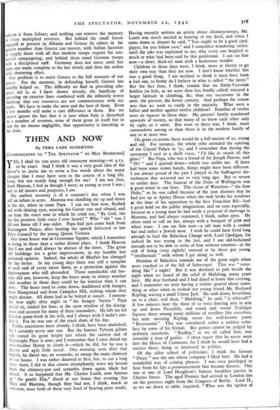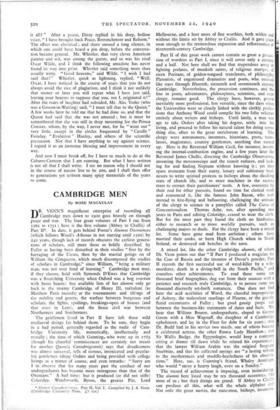THEN AND NOW
By VERA LADY ELDERTON [COMMUNICATED TO "THE SPECTATOR" BY MAX BEERBOHM]
YES, I shall be roo years old tomorrow morning—at 4.15, to be exact. And I think it was a very good idea of the Editor's to invite me to write a few words about the many changes that I must have seen in the course of a long life. Long, but not nearly long enough for me! I am not (but, thank Heaven, I feel as though I were) as young as ever I was ; and to all intents and purposes, I am.
My earliest memory is of a summer's day when I was still an infant in arms. Mamma was dandling me up and down in the air, when in came Papa. I can see him now, flushed and with shining eyes, wearing his Garter star and riband, and can hear the exact tone in which he cried out, "By God, she has the prettiest little voice I ever heard! " Who " she" was I did not know till I was older. Papa had just come back from Kensington Palace, after hearing the speech delivered to her Privy Council by the young Queen Victoria.
Our town house was in Grosvenor Square, which I remember as being in those days a rather dismal place. I thank Heaven that I am and shall always be abreast of the times. The great tall buildings are a great improvement, in my humble but animated opinion. Indeed, the whole of Mayfair has changed for the better. In my young days there was still a turnpike at each end of every street there, as a protection against the highwaymen who still abounded. These ramshackle old bar- riers did not, however, keep the bears away in wintry weather (and weather in those days could be far wintrier than it can now). The bears used to come down, maddened with hunger, from Hampstead and from Campden Hill, seeking whom they might devour. All doors had to be bolted at sunset. I remem- ber how night after night in "the hungry 'forties" Papa would sit, loaded for bear, at the open window of the dining- room and account for many of these marauders. He left me his London game-book in his will, and I always wish I hadn't mis- laid it. For he was one of the crack shots of his day.
Public executions must already, I think, have been abolished; for I certainly never saw one. But the famous Tyburn gibbet Still reared its great height just where the eastern end of Connaught Place is now; and I remember that I once dared my nvin-brother Henry to climb it—which he did, for he was a Plucky and agile little rascal. One morning soon after that exploit, he dared me, en revanche, to sweep the main chimney of our house. I was rather daunted at first, but, to cut a long story short, I did in due course triumphantly wave my broom from the chimney-pot and scramble down again, black but Proud. It so happened that Mr. Charles Lamb, now famous as "the gentle Elia," dined at our house that evening (for Papa and Mamma, though they had not, I think, much in Common, were both of them very fond of hearing puns made). Having recently written an article about chimneysweeps, Mr. Lamb was much excited at hearing of my deed, and when I came down to dessert he said, "You ought to be a good card- player, for you follow soot," and I remember wondering rather, until the joke was explained to me, why every one laughed so much at what had been said by this gentleman. I can see him now—a short, thick-set man with a humorous twinkle.
Children in those days were, I think, more at Liberty to go their own way than they are now. I don't know whether this was a good thing. I am inclined to think it must have been a bad one, so firmly do I believe in what is called "the latest." But the fact does, I think, remain that we Early-Victorian kiddies (or kids, as we were then less fondly called) enjoyed a larger latitude in climbing, &c, than our successors in the next, the present, the better century. And perhaps the reason was that we were so vastly in the majority. What were a father and mother against twelve children? Families of twelve were de rigueur in those days. My parents' family numbered upwards of twenty, so that many of us knew each other only by sight, as it were. But even so there was, I think, more camaraderie among us than there is in the modern family of one or at most two.
On great occasions there would be a full muster of us, young and old. For instance, the whole tribe attended the opening of the Crystal Palace in '51, and I remember that during the ceremony I said in a shrill voice, " I'd like to smash all this glass! " But Papa, who was a friend of Sir Joseph Paxton, said and I quieted down—which was unlike me. If there had been some stones handy, things might have been different. I am always proud of the part I played in the Suffragette dis- turbances that occurred not so very long ago. But to return to earlier days. The funeral of the Duke of Wellington was a great event in our lives. The victor of Waterloo—" the Iron Duke," as he was called because of the iron shutters that he had put up at Apsley House when the mob broke his windows at the time of his opposition to the first Franchise Bill—had a great hold on the public imagination, and on ours especially, because as a young man he had made a proposal of marriage to Mamma, and had always remained, I think, rather epris. He often used to call on her, always with a bouquet of pink and white roses. I can see him now—a tall man with a cocked hat and rather a Jewish nose. I wish he could have lived long enough to lead the Balaclava Charge with Lord Cardigan, for indeed he was young to the last, and I am old-fashioned enough not to be able to write of him without emotion—at the risk of being (very rightly) sneered at by those gay young " intellectuals " with whom I get along so well.
Mention of Balaclava reminds me of the great night when news reached us of the fall of Sebastopol. That was "some- thing like" a night! But it was destined to pale beside the night when we heard of the relief of Mafeking, many years later. My dear husband and I had dined at home that evening, and I remember we were having a violent quarrel about some- thing or other when in rushed our young friend Mr. Rudyard Kipling, waving a small Union Jack. He sank down, breathless, on to a chair, and then, " Mafeking," he said, "is relieved!" A few minutes later the three of us were dancing arm in arm up and down Piccadilly, and round and round Trafalgar Square, three among many millions of revellers like ourselves, but next morning Kipling wrote his well-known poem "Recessional." This was considered rather a sudden volte- face by some of his friends. But genius cannot be judged by ordinary standards. " Rudkip," as we all called him, was certainly a man of genius. I often regret that he never went into the House of Commons, for I think he would have had a success there, being so interested in politics.
Of the older school of politicians, I think the famous " Dizzy " was the one whose company I liked best. He had a wonderful way of coining phrases. I was once privileged to hear from his lips a pronouncement that became historic. This was at one of Lord Houghton's famous breakfast parties in Charles Street. The aged Premier had arrived in London late on the previous night from the Congress of Berlin. Lord H., as we sat down to table, inquired, "What was the upshot of it all?" After a pause, Dizzy replied in his deep, hollow voice, "I have brought back Peace, Retrenchment and Reform." The effect was electrical ; and there ensued a long silence, in which one could have heard a pin drop, before the conversa- tion became general. Mr. Whistler, that very clever American painter and wit, was among the guests, and so was his rival Oscar Wilde, and I think the following anecdote has never found its way into print. Whistler said something more than usually witty. "Good heavens," said Wilde, "I wish I had said that!" Whistler, quick as lightning, replied, "Well, Oscar, I have noticed in the course of years that you do not always avoid the vice of plagiarism, and I think it not unlikely that sooner or later you will repeat what I have just said, leaving your hearers to suppose that you, not I, originated it!" After the roars of laughter had subsided, Mr. Alec Yorke (who was a Groom-in-Waiting) said, "I must tell that to the Queen." A few weeks later he told me that he had done so, and that the Queen had said that she was not amused ; but it must be remembered that she was still in deep mourning for the Prince Consort, whom, by the way, I never met, for he "went out" very little, except in the circles frequented by " Candle " Faraday, " Evolution " Huxley, and others of the scientific persuasion. Not that I have anything to say against science. I regard it as an immense blessing and improvement in every way.
And now I must break off, for I have so much to do at the Cabaret-Canteen that I am running. But what I have written is not all that I shall write. I see no reason why I should not in the course of nature live to be 200, and I shall then offer to generations yet unborn many spicy memorials of the years to come.



























































 Previous page
Previous page